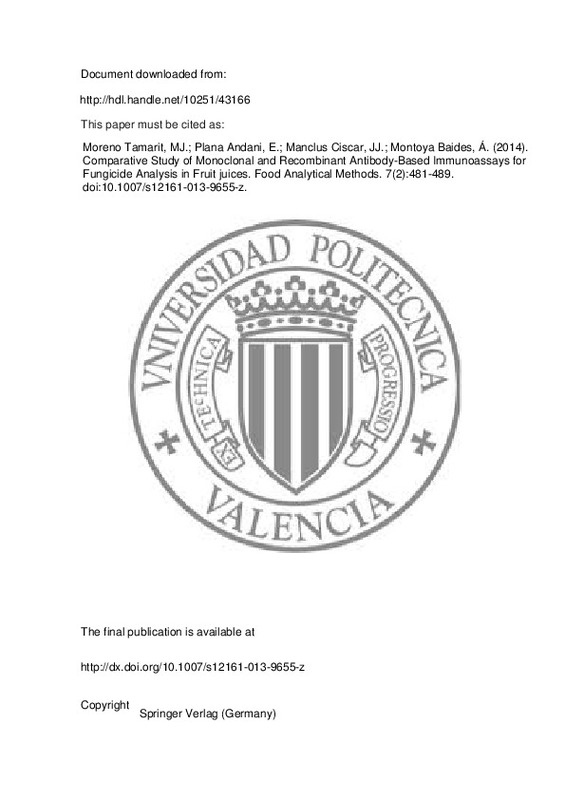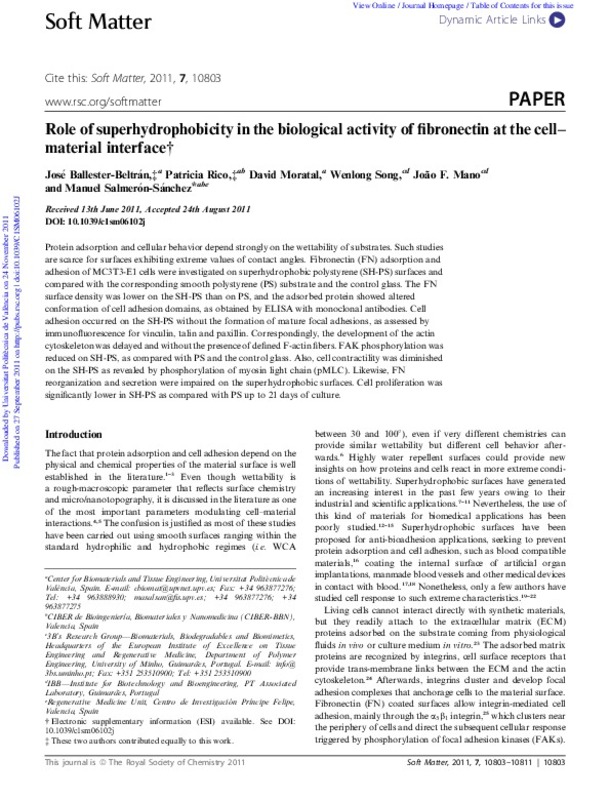JavaScript is disabled for your browser. Some features of this site may not work without it.
Buscar en RiuNet
Listar
Mi cuenta
Estadísticas
Ayuda RiuNet
Admin. UPV
Development of monoclonal antibody-based immunoassays for the analysis of bisphenol A in canned vegetables
Mostrar el registro sencillo del ítem
Ficheros en el ítem
| dc.contributor.author | Moreno Tamarit, Mª José
|
es_ES |
| dc.contributor.author | D'Arienzo, Pasquale
|
es_ES |
| dc.contributor.author | Manclus Ciscar, Juan José
|
es_ES |
| dc.contributor.author | Montoya Baides, Ángel
|
es_ES |
| dc.date.accessioned | 2016-11-16T12:44:23Z | |
| dc.date.available | 2016-11-16T12:44:23Z | |
| dc.date.issued | 2011 | |
| dc.identifier.issn | 0360-1234 | |
| dc.identifier.uri | http://hdl.handle.net/10251/74195 | |
| dc.description.abstract | The aim of this work was the development of monoclonal antibodies (MAbs) and highly sensitive immunoassays (ELISAs) to bisphenol A (BPA), a well-known endocrine disruptor able to migrate from the internal coating of cans to food contained inside, particularly vegetables. To produce MAbs to BPA, four synthetic compounds were conjugated to proteins and used as immunizing haptens in mice. By applying hybridoma technology, several MAbs were produced and selected. These antibodies were characterized in the conjugate-coated and in the antibody-coated formats, using both homologous and heterologous conjugates. Three indirect ELISA based on the MAbs showing the highest affinity to BPA were selected. The limit of detection of the most sensitive ELISA was 0.22 nM (0.05 ng/mL), with an I50 value of around 1 nM (0.23 ng/mL). An homologous ELISA based on the MAb BPAB-11 was applied to the simple, direct determination of BPA in the liquid portion of canned artichoke, peas, and sweet corn. Only sample dilution in an appropriate saline buffer was required to minimize matrix effects and to enter the ELISA working range. Recovery and precision of the method were evaluated by spiking the liquid portion of these cans with BPA at 20, 50, and 100 ng/mL. Coefficients of variation were below 20% in most cases. With regard to recovery, the analytical data obtained were also acceptable. This immunoassay has therefore proved its potential as a new tool for the rapid, sensitive and accurate determination of BPA in canned food. © Taylor & Francis Group, LLC. | es_ES |
| dc.description.sponsorship | This work was supported by the Spanish MICINN project No. AGL2006-13361 | en_EN |
| dc.language | Inglés | es_ES |
| dc.relation.ispartof | Journal of Environmental Science and Health, Part B | es_ES |
| dc.rights | Reserva de todos los derechos | es_ES |
| dc.subject | Bisphenol A | es_ES |
| dc.subject | Canned food | es_ES |
| dc.subject | ELISA | es_ES |
| dc.subject | Epoxy resins | es_ES |
| dc.subject | Monoclonal antibodies | es_ES |
| dc.subject | Polycarbonate plastics | es_ES |
| dc.subject | Analytical data | es_ES |
| dc.subject | Antibody-based immunoassays | es_ES |
| dc.subject | Coefficients of variations | es_ES |
| dc.subject | Direct determination | es_ES |
| dc.subject | Endocrine disruptor | es_ES |
| dc.subject | Highly sensitive | es_ES |
| dc.subject | Hybridoma technology | es_ES |
| dc.subject | Limit of detection | es_ES |
| dc.subject | Matrix effects | es_ES |
| dc.subject | Monoclonal antibodies (mAbs) | es_ES |
| dc.subject | Saline buffers | es_ES |
| dc.subject | Sample dilution | es_ES |
| dc.subject | Sweet corns | es_ES |
| dc.subject | Synthetic compounds | es_ES |
| dc.subject | Working range | es_ES |
| dc.subject | Liquids | es_ES |
| dc.subject | Mammals | es_ES |
| dc.subject | Phenols | es_ES |
| dc.subject | Surface plasmon resonance | es_ES |
| dc.subject | Vegetables | es_ES |
| dc.subject | Canning | es_ES |
| dc.subject | 4,4' isopropylidenediphenol | es_ES |
| dc.subject | Hapten | es_ES |
| dc.subject | Monoclonal antibody | es_ES |
| dc.subject | Phenol derivative | es_ES |
| dc.subject | Antibody | es_ES |
| dc.subject | Dilution | es_ES |
| dc.subject | Experimental study | es_ES |
| dc.subject | Immunoassay | es_ES |
| dc.subject | Plastic | es_ES |
| dc.subject | Resin | es_ES |
| dc.subject | Rodent | es_ES |
| dc.subject | Vegetable | es_ES |
| dc.subject | Animal | es_ES |
| dc.subject | Article | es_ES |
| dc.subject | Bagg albino mouse | es_ES |
| dc.subject | Chemistry | es_ES |
| dc.subject | Enzyme linked immunosorbent assay | es_ES |
| dc.subject | Female | es_ES |
| dc.subject | Food contamination | es_ES |
| dc.subject | Food preservation | es_ES |
| dc.subject | Hybridoma | es_ES |
| dc.subject | Immunology | es_ES |
| dc.subject | Methodology | es_ES |
| dc.subject | Mouse | es_ES |
| dc.subject | Animals | es_ES |
| dc.subject | Antibodies, Monoclonal | es_ES |
| dc.subject | Enzyme-Linked Immunosorbent Assay | es_ES |
| dc.subject | Food, Preserved | es_ES |
| dc.subject | Haptens | es_ES |
| dc.subject | Hybridomas | es_ES |
| dc.subject | Mice | es_ES |
| dc.subject | Mice, Inbred BALB C | es_ES |
| dc.subject | Cynara scolymus | es_ES |
| dc.subject | Mus | es_ES |
| dc.subject | Pisum sativum | es_ES |
| dc.subject | Zea mays | es_ES |
| dc.subject.classification | TECNOLOGIA ELECTRONICA | es_ES |
| dc.title | Development of monoclonal antibody-based immunoassays for the analysis of bisphenol A in canned vegetables | es_ES |
| dc.type | Artículo | es_ES |
| dc.identifier.doi | 10.1080/03601234.2011.583871 | |
| dc.relation.projectID | info:eu-repo/grantAgreement/MEC//AGL2006-13361/ES/DESARROLLO DE TECNICAS INMUNOQUIMICAS PARA EL ANALISIS DE COMPUESTOS SUSCEPTIBLES DE MIGRACION DESDE LOS ENVASES A LOS ALIMENTOS./ | es_ES |
| dc.rights.accessRights | Cerrado | es_ES |
| dc.contributor.affiliation | Universitat Politècnica de València. Escuela Técnica Superior de Ingenieros Industriales - Escola Tècnica Superior d'Enginyers Industrials | es_ES |
| dc.contributor.affiliation | Universitat Politècnica de València. Instituto Interuniversitario de Investigación en Bioingeniería y Tecnología Orientada al Ser Humano - Institut Interuniversitari d'Investigació en Bioenginyeria i Tecnologia Orientada a l'Ésser Humà | es_ES |
| dc.description.bibliographicCitation | Moreno Tamarit, MJ.; D'arienzo, P.; Manclus Ciscar, JJ.; Montoya Baides, Á. (2011). Development of monoclonal antibody-based immunoassays for the analysis of bisphenol A in canned vegetables. Journal of Environmental Science and Health, Part B. 46(6):509-517. https://doi.org/10.1080/03601234.2011.583871 | es_ES |
| dc.description.accrualMethod | S | es_ES |
| dc.description.upvformatpinicio | 509 | es_ES |
| dc.description.upvformatpfin | 517 | es_ES |
| dc.type.version | info:eu-repo/semantics/publishedVersion | es_ES |
| dc.description.volume | 46 | es_ES |
| dc.description.issue | 6 | es_ES |
| dc.relation.senia | 192878 | es_ES |
| dc.contributor.funder | Ministerio de Educación y Ciencia | es_ES |
| dc.contributor.funder | Universitat Politècnica de València | es_ES |






![[Cerrado]](/themes/UPV/images/candado.png)



